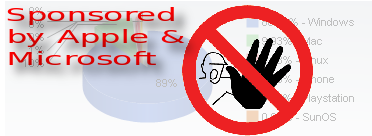
Summary: People who are connected to Microsoft (some being former staff) link to a firm that is connected to Microsoft in order to create the illusion that Vista 10 market share grew to 6.63%
Developers from Microsoft privately told me that Microsoft wants to keep Vista 10 figures secret. Why? Because it's embarrassing. If people knew the truth, it would be damaging to Microsoft's business and stock. Our Vista 10 Wiki page has been accessed more than 10,000 times since the release of the operating system, so there is clearly a thirst for real facts, not marketing, regarding Vista 10.
Boosters of Microsoft are now working quite hard (maybe overtime) to change perceptions about Vista 10 adoption rates. Microsoft Emil (Emil Protalinski)
uses data from Microsoft's partner in order to make Vista 10 look bigger than it is whilst also making fun of GNU/Linux, with the snide remark "Linux finally passes Windows Vista" (right there in the headline!).
"I've read the article," told me
this one person, "and the guy belittles Linux, saying now it surpassed Vista... What a moron." Well, he is a longtime Microsoft booster, a predecessor of Microsoft Peter at
the increasingly Microsoft-leaning Condé Nast (Microsoft literally pays them for this). Microsoft Emil isn't being honest; he may be trying reinforce the myth of Linux as a failure, despite Android, Red Hat, etc. Recall what
Microsoft said in internal evangelism documents [PDF]: "Ideally, use of the competing technology becomes associated with mental deficiency, as in, "he believes in Santa Claus, the Easter Bunny, and OS/2." Just keep rubbing it in, via the press, analysts, newsgroups, whatever. Make the complete failure of the competition's technology part of the mythology of the computer industry. We want to place selection pressure on those companies and individuals that show a genetic weakness for competitors' technologies, to make the industry increasingly resistant to such unhealthy strains, over time."
There is generally a lot of Vista 10 propaganda right now, always citing Microsoft-linked data and usually coming from Microsoft-linked people, e.g.
from Lance Whitney, who used to work for a Microsoft publisher before joining
CNET, i.e.
CBS. Well, he does the same as Emil, using the same disgraced firm with its biased data.
Gregg Keizer too
cites Net Applications, despite his history being somewhat sceptical of Microsoft. Does he know that
Net Applications is not a reliable source of web statistics? It’s biased by selection (e.g. of sites to sample from) and linked closely to Microsoft (with
Microsoft's money on the table), even in the staff sense. Watch their list of clients and list of staff. A
familiar ploy?
A sort of 'broken telephone' effect passed this message to a lot of sites yesterday [
1,
2,
3,
4], leaving people with the false impression that Vista 10 experienced decent growth/adoption.
Microsoft boosters like Bogdan Popa,
Microsoft affiliates like Wayne Williams, and
Microsoft advocacy sites like WinBeta are doing what is effectively marketing, not journalism, always citing data from the same Microsoft-connected firm. That's like asking a Red Hat partner and citing it regarding server share of RHEL (worldwide). It's a mockery of the very notion of journalism.
Vista 10 market share is vastly smaller than reported right now by many sites, all of which link to a Microsoft-connected firm, except perhaps
Gregg Keizer's colleague from
IDG. He wrote that "Windows 10 uptake is falling back to earth after an explosive first month."
Well, it wasn't explosive at all, it was virtually
force-fed with a zero-cost claim and despite that, it still has shown little progress. Judging by our logs at
Techrights, Vista 10 now has a market share of 1.01%. Judging by our logs at
Tux Machines, Vista 10 now has a market share of 0.201%. These logs of course aren't being shared with villaneous companies like Net Applications, which probably sample lots of sites that attract Windows users. GNU/Linux is a privacy-respecting niche and sites that welcome many GNU/Linux users probably hardly spy on their visitors (log sharing practices), or have the GNU/Linux clients masked at the visitors' request (think of
DoNotTrack for instance).
⬆

